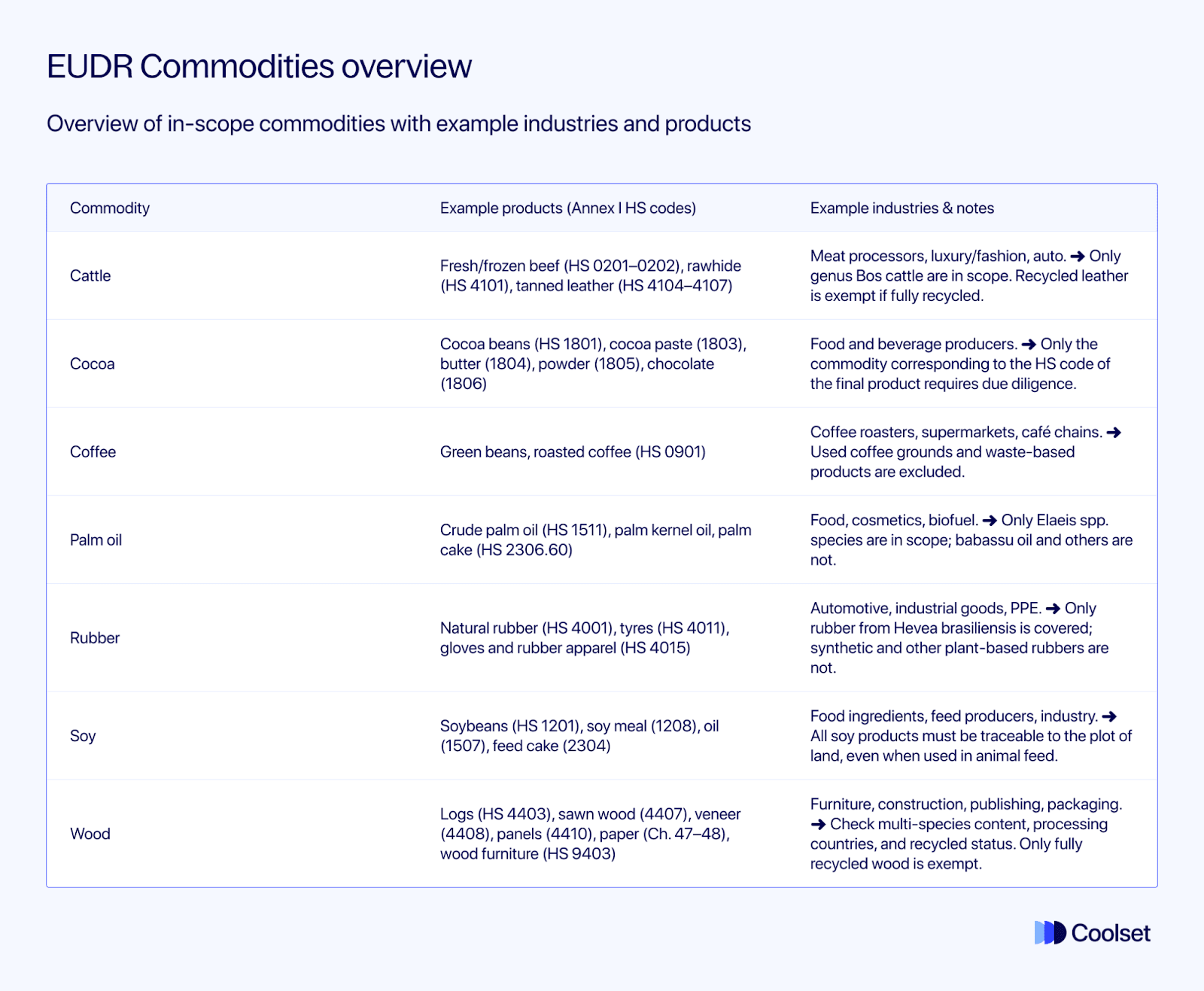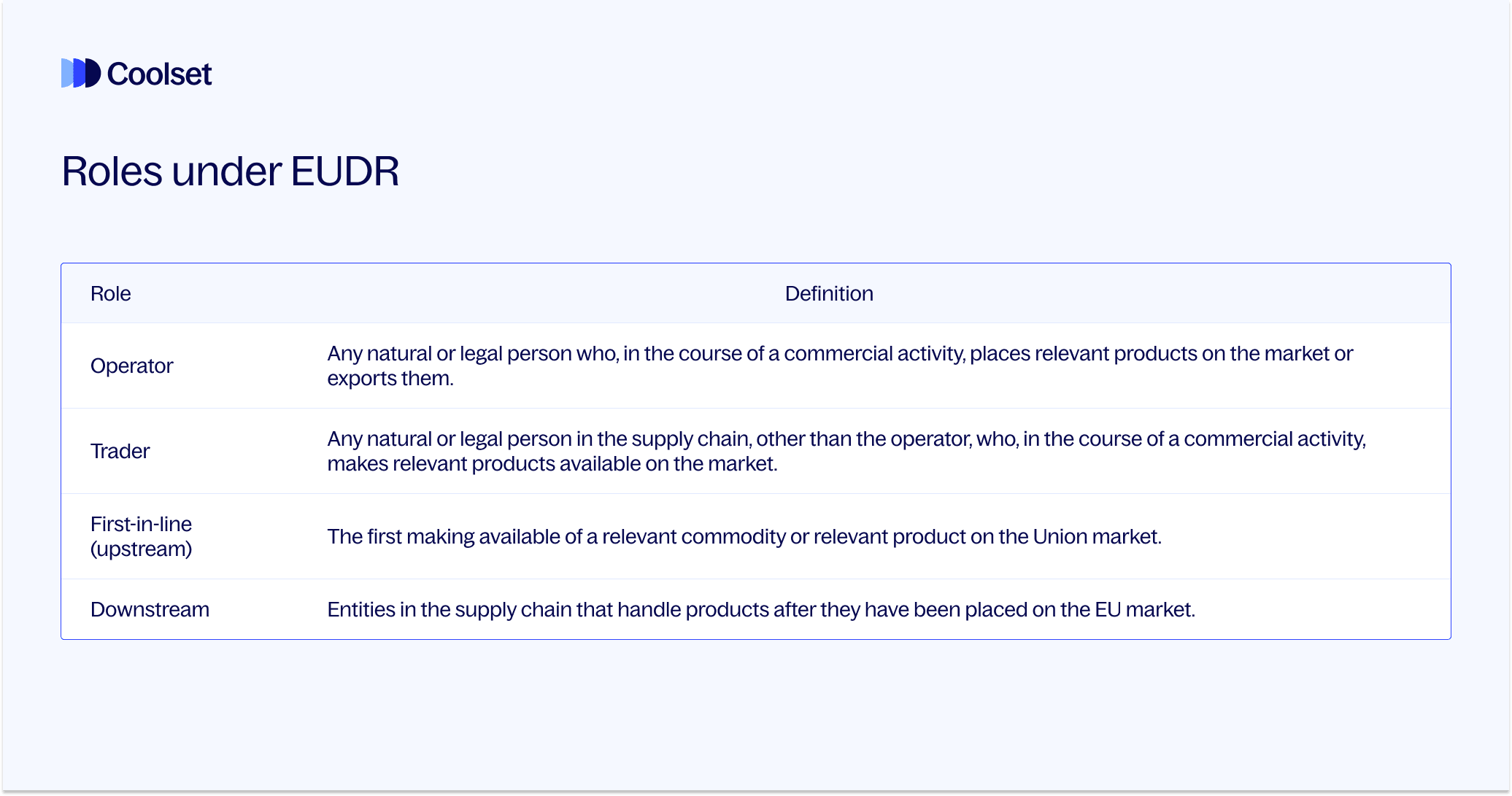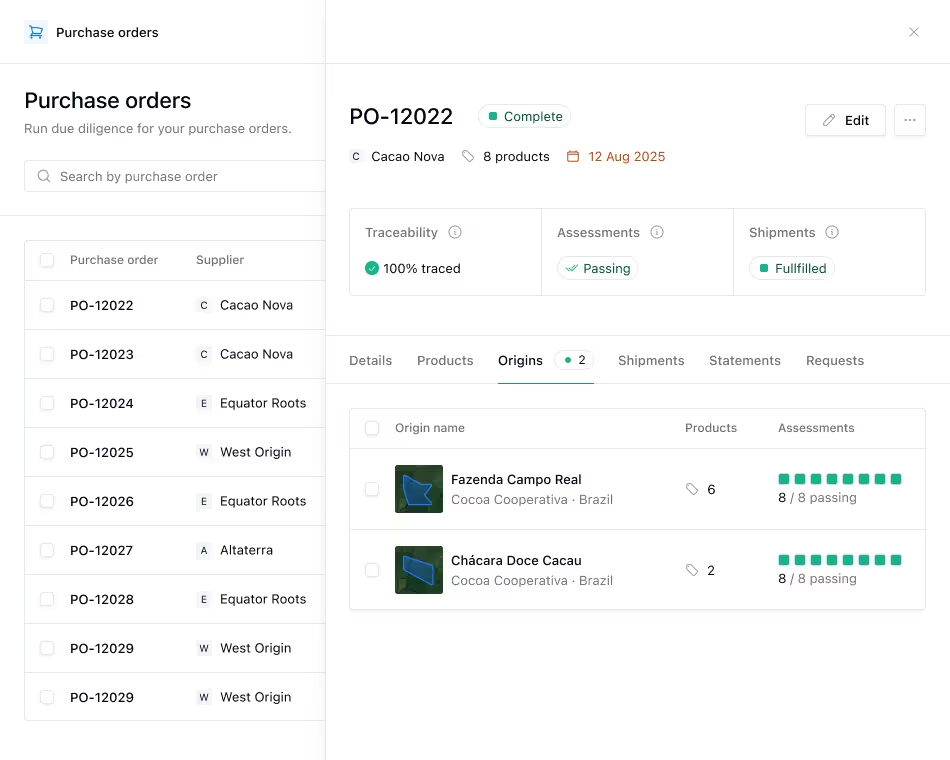Disclaimer: New EUDR developments - December 2025
In November 2025, the European Parliament and Council backed key changes to the EU Deforestation Regulation (EUDR), including a 12‑month enforcement delay and simplified obligations based on company size and supply chain role.
Key changes proposed:
These updates are not yet legally binding. A final text will be confirmed through trilogue negotiations and formal publication in the EU’s Official Journal. Until then, the current EUDR regulation and deadlines remain in force.
We continue to monitor developments and will update all guidance as the final law is adopted.
The EU Deforestation Regulation (EUDR) is a new European law designed to ensure that certain commodities are deforestation-free and legally produced. In short, it aims to stop products linked to recent forest loss from entering the EU market. Applying to seven core commodities and derived products, the EUDR aims to cut to the heart of deforestation drivers.
Businesses of all sizes are in scope. The EUDR applies to any company that places relevant products on the EU market or exports them - regardless of size. While small and micro companies may benefit from adjusted obligations or extended timelines, they are not exempt.
Under current law, all operators and traders must comply by 30 December 2025. SMEs (small and micro enterprises) have until 30 June 2026.
Important:
In November 2025, the European Parliament adopted amendments introducing further adjustments for SMEs, including:
These amendments are not yet legally binding. They require final approval through trilogue negotiations. Until then, SMEs should prepare based on the current regulation and applicable compliance timelines.
In this article we’ll walk you through the EUDR, and how it specifically applies to SMEs. We’ll give you a comprehensive understanding of the (conditional) lightened requirements for SME operators and traders, and outline how the compliance timelines differ for medium and small / micro firms.
The EUDR is part of the EU’s Green Deal agenda to combat global deforestation (see EUDR pillar page for more details). It ensures EU consumption of certain products no longer drives deforestation or forest degradation. In practice, the law prohibits placing specific high-risk commodities on the EU market (or exporting them) unless they are verified “deforestation-free” and produced in accordance with local laws. Depending on your role and size, this could include submitting a full due diligence statement, completing a simplified declaration, or keeping records that prove compliance and origin. You must be able to show that your products meet EUDR standards and that supporting information is available if requested by authorities.
Any company that operates in the supply chains of the covered commodities – defined as either an ‘operator’ or a ‘trader’ under the law – must follow the EUDR. In essence, if you place and/or make available these commodities or products on the EU market, or export them, you must prove they’re not sourced from recently deforested land.
The regulation refers to these seven commodities:
Alongside these products, the regulation covers many of their derivatives, such as chocolate, furniture, tires, paper, and palm oil-based ingredients.
For a detailed breakdown of all covered commodities and their derivatives, check our sector-by-sector overview.

The term SME covers a range of company sizes. The EU defines a medium, small or micro-sized enterprise based on employee count and financial thresholds.
*Net turnover: ≤ EUR 10,000,000 (standard)≤ EUR 15,000,000 (maximum allowed by Member States)
*Balance sheet total: ≤ EUR 5,000,000 (standard)≤ EUR 7,500,000 (maximum allowed by Member States)
If your business falls into any of these categories, it’s considered an SME for regulatory purposes. Under EUDR, company size determines your compliance deadline.
Medium-sized enterprises are treated the same as large firms in the rollout of EUDR. This means that medium companies must comply with EUDR by December 30, 2025, alongside large companies.
The extended deadline is only applicable to small and micro businesses, who are given slightly longer to prepare for the new regulation. Small and micro businesses have a delayed compliance deadline of June 30, 2026, by which point they must be fully EUDR compliant.
Important:
The EU Parliament’s recent amendments propose that small and micro enterprises handling non-timber products would have until 30 June 2027 to comply, offering an extra year beyond the existing extension. For SMEs that qualify as primary producers in low-risk countries, the due diligence requirement could be replaced with a one-time simplified declaration. However, SMEs acting as importers or placing goods on the market for the first time are still treated as operators and must carry out full due diligence.
These proposed changes are not yet legally binding and still require approval through trilogue negotiations. Until confirmed, SMEs should continue working toward current compliance deadlines.
For an overview of the Parliament’s amendments to roles and responsibilities, refer to this breakdown.

To comply with the EUDR, SMEs must follow certain simplified procedures in order to prove that no deforestation activities have taken place. The streamlining of EUDR compliance for SMEs include a deferred entry in application, fewer obligations for downstream SME operators, no annual reporting obligations and the opportunity to mandate an authorised representative.
Important:
In October 2025, the European Commission proposed amendments to the EUDR introducing simplified compliance mechanisms for small and micro undertakings, particularly those that also act as primary producers. In November 2025, the European Parliament adopted these proposals and extended them further. Notably, it pushed the deadline for small and micro operators (for non-timber products) to 30 June 2027 and clarified that simplified declarations only need to be updated if major changes occur. It also allowed postal addresses to be used in place of GPS coordinates for small/micro operators and removed redundant DDS pass-on duties for traders.
However, these changes are not yet adopted. Until the proposal is formally approved, the current EUDR framework applies as per the original guidelines
As an operator (placing a product on the market) under EUDR you are required to perform due diligence. This includes collecting data, assessing and mitigating risk, and submitting a due diligence statement for that product. The extensiveness of due diligence depends on the risk benchmark of the source country, with those sourcing from low-risk countries exempt from conducting risk mitigations and assessments. All operators, regardless of size, have a responsibility to ensure the commodity is deforestation-free and legal. For a full understanding of an operator’s responsibilities under EUDR, check out our step-by-step guide.

However, a helpful allowance has been made for SMEs. If an SME’s product has already undergone EUDR due diligence or is accompanied by a declaration identifier, SME operators can skip duplicating the due diligence work, and simply record the existing DDS reference number. For example, if a coffee roaster imports coffee directly from a farm in Guatemala, they file a DDS for that coffee. If they also buy cocoa from an EU supplier, and the cocoa supplier has already undergone EUDR due diligence, the coffee roaster wouldn't be required to redo it - just reference the cocoa supplier’s DDS or declaration identifier.
Practically, this means that only SMEs who are the first to place a product on the EU market (or export it) are required to exercise due diligence and submit a DDS. SME operators that are first in the supply chain are required to perform the full due diligence process - there are no shortcuts. However, if DD has already been completed, SME operators can skip DD requirements, and pass on the reference number of a previous DDS.
Important:
In November 2025, the European Parliament adopted amendments allowing small and micro primary operators in low-risk countries to submit a one-time simplified declaration instead of full due diligence, even when placing products on the market for the first time. The declaration only needs to be updated if major changes occur. These changes are not yet legally binding.
SME operators also benefit from lighter mitigation measures to ease compliance burdens under EUDR. These provisions are designed to support SMEs in adapting to the regulations, whilst maintaining the integrity of deforestation-free supply chains.
For example, SMEs are exempted from appointing a compliance officer and conducting independent audits. Unlike non-SMEs, who are required to have their internal policies and procedures independently audited, the EUDR regulation provides relief from this administrative and financial burden for SMEs. SME operators are also not subject to the annual reporting obligations of their due diligence system.
Note: In November 2025, the European Parliament adopted further simplifications for small and micro operators. These are not yet legally binding, so SMEs should continue to prepare based on the current regulation.

Operators that are microenterprises (<10 staff and < €2 million turnover and/or < €2 million turnover) or a natural person are allowed to mandate the next operator or trader down the supply chain as an authorised representative. The authorised representative is then able to submit a due diligence statement on behalf of the micro-operator, provided the authorised representative is not a natural person or micro enterprise themselves. Whilst this releases microenterprises and natural persons from being burdened with due diligence obligations, those mandating remain responsible for the overall compliance of the product with EUDR.
If you are a trader under the EUDR, your business only deals in products that have already been placed on the EU market by someone else. As an SME trader, you have significantly simplified responsibilities, and act to pass along information, rather than collect it. SME traders are not required to exercise due diligence or submit a due diligence statement. They are only obliged to collect relevant information regarding their suppliers (name; address; DDS reference etc), and hold the information for a minimum of 5 years. SME traders are also subject to lighter checks by the competent authorities - and they are excluded from mandatory quotas for checks that competent authorities must perform.
Note: The European Parliament has proposed removing the requirement for SME traders to pass on DDS reference numbers. Under these amendments, only the first downstream operator would retain that obligation. These changes are not yet legally binding.
Step 1: Confirm role as an operator
Step 2: Identify in-scope commodities and map to CN codes
Step 3: Map your supply chain
Step 4: Check if due diligence has been exercised, and there is an existing DDS
Step 5: (If no DD exercised) Collect all required data (geolocation, data, information)
Step 6: (If no DD exercised) Risk assessment and risk mitigation
Step 7: Upload or reference a due diligence statement
For details on how the new country-benchmarking risk levels affect your DDS obligations, see our article.
Step 8: Keep records for 5 years
Disclaimer:
This guide reflects current EUDR obligations and incorporates potential simplifications adopted by the European Parliament in November 2025. These changes, including simplified declarations for small and micro primary operators, are not yet legally binding.
{{custom-cta}}
To illustrate, we will consider a hypothetical coffee roaster (GreenBeanz) based in the EU. GreenBeanz has 25 employees and sources their coffee beans from various origins. Under EUDR they are considered a ‘small’ enterprise, and have a compliance deadline of 30 June 2026. Here’s how they are preparing:
In summary, GreenBeanz are taking a proactive approach to be ready for the EUDR compliance deadline: mapping supply chains, identifying responsibilities, and maintaining records. It’s a significant effort for a small company, and many choose to rely on software or third-party support to confidently file due diligence statements.
Important:
This example reflects the current EUDR obligations and compliance process as they stand today under Regulation (EU) 2023/1115. The steps described - such as mapping supply chains, collecting geolocation data, and submitting or referencing due diligence statements - remain fully applicable until new legislative amendments are formally adopted.
If you want to understand how these responsibilities could change under the Parliament's adopted amendments read this deep dive
Even with the best intentions, it’s easy for SMEs to get caught out by misconceptions or oversights regarding EUDR. Here are some common mistakes to avoid:
Note: The following examples in this section reflect the current EUDR Regulation. Some obligations may change if the Parliament's November 2025 amendments are adopted, including reduced DDS pass-on requirements and simplified declaration options for small producers.
By being aware of these common mistakes, SMEs can take proactive steps to avoid them. EUDR compliance is absolutely achievable for small and medium businesses - it just requires early planning, attention to detail, and a clear understanding of your role. Use checklists to ensure you’re covering all bases, and don’t hesitate to seek out authoritative resources or expert advice for any areas of uncertainty.
Coolset’s EUDR solution helps companies collect the right data, check for deforestation risk, and file Due Diligence Statements without chasing suppliers or working in complex spreadsheets. With Coolset, companies can import product and order data from your ERP, request documents from suppliers, and track everything in one place. The system flags missing or at-risk shipments and generates audit-ready DDS files that follow the mandatory EU TRACES format.
Reach out to our team to see our EUDR module in action.
{{product-tour-injectable}}
Yes. Under the original EUDR, all SMEs are in scope. Medium-sized businesses follow the same rules and deadlines as large companies (30 Dec 2025). Small and micro enterprises have until 30 June 2026. Note: Parliament voted to extend this deadline to 30 Dec 2026 and introduce simplifications for small primary operators. These are not yet law.
SME operators place or export in-scope products for the first time. SME traders buy and sell goods already placed on the market. Operators must conduct due diligence; traders only need to store and pass on traceability data. Parliament update: Downstream SME traders may benefit from reduced DDS obligations if amendments are finalised.
If your supplier already submitted a valid DDS, you don’t need to duplicate it. Instead, you must reference that DDS and maintain traceability records. Note: Under the Parliament vote, this is reinforced, operators and traders can reuse existing DDS without new submissions, but must store and pass on reference details.
SME operators must collect geolocation data, production dates, product and shipment info, supplier and buyer contacts, and legality and deforestation-free evidence. Parliament update: Small and micro primary operators in low-risk countries could submit a one-time simplified declaration instead, with lighter data requirements (e.g. postal address allowed).
Penalties for EUDR non-compliance can include:
Even small firms are subject to checks and audits. SMEs are advised to act early to avoid supply disruptions or regulatory action once enforcement begins.
5 practical steps to prepare for and stay audit-ready for EUDR

This free compliance checker scans your packaging documentation and maps it against mandatory PPWR data requirements, giving you a clear view of your compliance status. Get actionable insights on documentation gaps before they become compliance issues.
Our research team walks you through every step - from supplier engagement to submitting in TRACES.

Based on customer case studies our team has developed a realistic timeline and planning for EUDR compliance. Access it here.